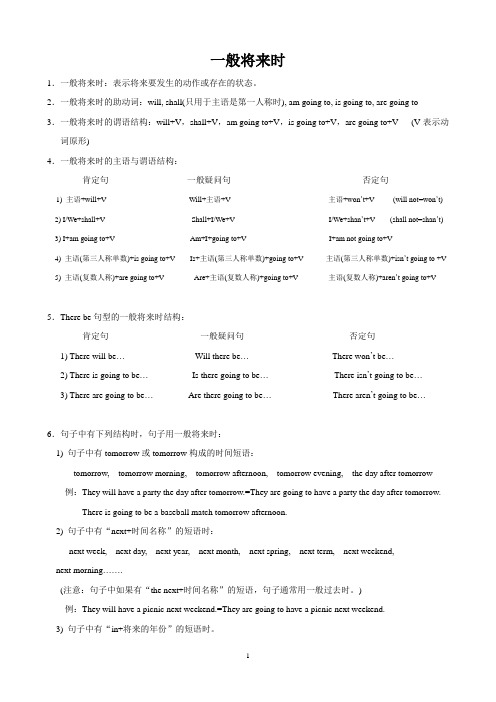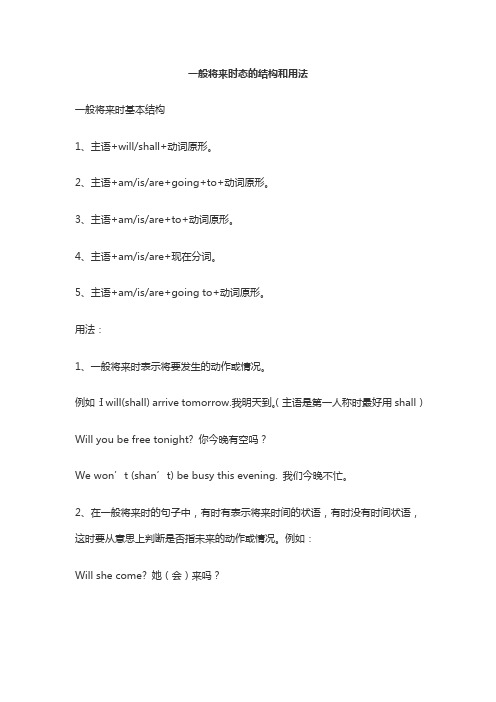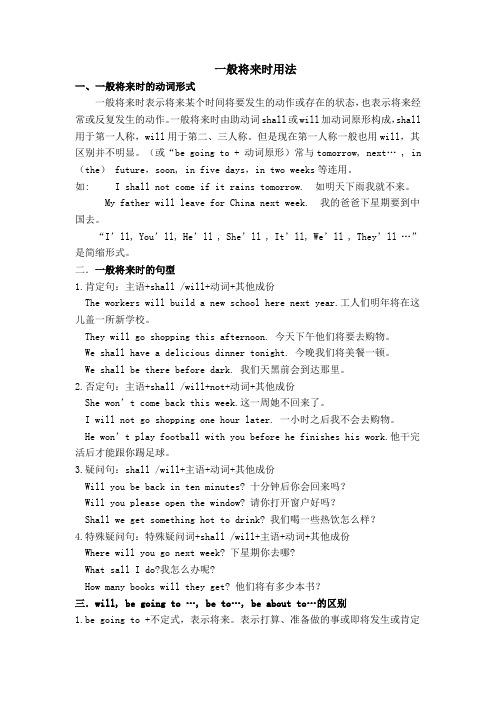动词-一般将来时
一般将来时用法总结

一般将来时1.一般将来时:表示将来要发生的动作或存在的状态。
2.一般将来时的助动词:will, shall(只用于主语是第一人称时), am going to, is going to, are going to3.一般将来时的谓语结构:will+V,shall+V,am going to+V,is going to+V,are going to+V (V表示动词原形)4.一般将来时的主语与谓语结构:肯定句一般疑问句否定句1) 主语+will+V Will+主语+V 主语+won’t+V (will not=won’t)2) I/We+shall+V Shall+I/We+V I/We+shan’t+V (shall not=shan’t)3) I+am going to+V Am+I+going to+V I+am not going to+V4) 主语(第三人称单数)+is going to+V Is+主语(第三人称单数)+going to+V 主语(第三人称单数)+isn’t going to +V5) 主语(复数人称)+are going to+V Are+主语(复数人称)+going to+V 主语(复数人称)+aren’t going to+V5.There be句型的一般将来时结构:肯定句一般疑问句否定句1) There will be…Will there be…There won’t be…2) There is going to be…Is there going to be…There isn’t going to be…3) There are going to be…Are there going to be…There aren’t going to be…6.句子中有下列结构时,句子用一般将来时:1) 句子中有tomorrow或tomorrow构成的时间短语:tomorrow, tomorrow morning, tomorrow afternoon, tomorrow evening, the day after tomorrow 例:They will have a party the day after tomorrow.=They are going to have a party the day after tomorrow.There is going to be a baseball match tomorrow afternoon.2) 句子中有“next+时间名称”的短语时:next week, next day, next year, next month, next spring, next term, next weekend,next morning…….(注意:句子中如果有“the next+时间名称”的短语,句子通常用一般过去时。
动词的一般将来时

动词的一般将来时动词的一般将来时是指将来发生或存在的动作、事件或状态。
在英语中,一般将来时可以通过加上助动词“will”或“shall”,或者用现在时代替来表达。
本文将详细介绍一般将来时的使用方法和注意事项。
1. 一般将来时的基本构成一般将来时的基本构成是“助动词will/shall + 动词原形”。
例如:- I will visit my grandparents next weekend. (我下个周末会拜访我的祖父母。
)- She shall attend the meeting tomorrow.(她明天将参加会议。
)2. 肯定句和否定句的构成在一般将来时的肯定句中,将“will/shall”放在主语之前。
例如:- They will go to the cinema tonight.(他们今晚将去电影院。
)- We shall travel to Europe next year.(我们明年将去欧洲旅行。
)在一般将来时的否定句中,需要在“will/shall”后加上“not”。
例如:- He will not attend the party.(他将不参加派对。
)- We shall not be late for the concert.(我们不会迟到音乐会。
)3. 疑问句的构成在一般将来时的疑问句中,将“will/shall”置于主语之前。
例如:- Will you come to the meeting tomorrow?(你明天会来参加会议吗?)- Shall we have dinner together tonight?(我们今晚一起吃晚饭吗?)4. 一般将来时的用法一般将来时可以用来表示以下几种情况:4.1 表示未来的计划或打算- I will start a new job next month.(我下个月将开始一份新工作。
)- She shall study abroad after graduation.(她毕业后将出国留学。
一般将来时态的结构和用法

一般将来时态的结构和用法一般将来时基本结构1、主语+will/shall+动词原形。
2、主语+am/is/are+going+to+动词原形。
3、主语+am/is/are+to+动词原形。
4、主语+am/is/are+现在分词。
5、主语+am/is/are+going to+动词原形。
用法:1、一般将来时表示将要发生的动作或情况。
例如:I will(shall) arrive tomorrow.我明天到。
(主语是第一人称时最好用shall)Will you be free tonight? 你今晚有空吗?We won’t (shan’t) be busy this evening. 我们今晚不忙。
2、在一般将来时的句子中,有时有表示将来时间的状语,有时没有时间状语,这时要从意思上判断是否指未来的动作或情况。
例如:Will she come? 她(会)来吗?3、在以第一人称I或we作主语的问句中,一般使用助动词shall,这时或是征求对方的意见,或是询问一个情况(b):a. Where shall we meet? 我们在哪儿碰头?b. Shall we have any classes tomorrow?明天我们有课吗?在这类问句中,近几年来也有不少人用will,特别是在美国。
例如:How will I get there? 我怎么去?扩展资料:一般将来时表示将来某一时段的动作或状态,或将来某一段时间内经常的动作或状态。
在英语时态中,“时“指动作发生的时间,”态“指动作的样子和状态。
一般将来时常常和表示将来的时间状语连用。
如:tomorrow(明天),next week (下周);in the future(将来);in a year(一年以后)等。
一般将来时由助动词shall(第一人称),will(所有人称)动词原形构成。
美式英语则不管什么人称,一律用will。
或用主语+be动词+ going to 动词(be going to)。
英语动词一般将来时

fewer, less和more
fewer
较少的;更少 的,few的比较 级,修饰可数 名词复数
我朋友比我的苹果少。 __________________________
less
more
较少的;更少的, 我钱包里的钱更少了。
little的比较级,修 饰不可数名词
_________________________
How are you going to spend your holidays?
假期你准备怎样过?
I think it is going to snow.我看要下雪了.
2)现在进行时(表示按计划安排要发生的事):
We’re having an English party tonight.
我们今晚将有个英语晚会.
(A)5.Industrial____has killed much of the river’s wildlife.
A. pollution B. prediction C. subway D. paper
Will people have robots?
in vs after
相同点: 这两个词后都可接时间,表示 “在 · · · · · · 以后” 不同点:
⒈“in+一段时间”表示以现在为起点的将来一 段时间以后,常与将来时连用.
⒉“after+一段时间”表示以过去某一时间点开 始的一段时间以后,常于一般 过去时连用. 当after后接某一时间点时,仍可用 于将来时.
How are you going ——by boat or by train?
你们怎么去,坐车去还是坐火车去?
但这只限于少量动词,如:go, come, leave, start, arrive, lunch, return,dine(吃饭), work, sleep, stay, play, do, have, wear 等
-一般将来时的结构与用法

Will you pass me that cup? Will you (please) help me with maths? Will you please lend me your pen?
will 在陈述句中用于各人称,在争求意见时或 示说话人向对方提出请求常用于第二人称。
❖ 对特殊疑问句要进行具体回答。
整理ppt
6
一般将来时的主要用法:
1、表示将来某一时刻的动作或状态: We shall(will) come to see you the day after tomorrow. There will be a wonderful show next week.
2、表示将来某一段时间内经常的动作或状态: The students will come and work in the lab once a week. we shall come and work in this factory every year.
10
三、be about to 结构表示将来
表示即将要发生的动作. Hurry up! We're about to leave. The football match is about to begin in a few minutes.
整理ppt
11
四、Revision of all forms with future meaning
----- Will they go there to study English? ----- Yes, they will. ----- No, they will not.
整理ppt
4
Shall we have a drink? Shall I open the window? Where shall we have the meeting?
(完整版)一般将来时的定义、结构、例句、用法

(完整版)一般将来时的定义、结构、例句、用法一般将来时一、定义一般将来时表示将来某一时刻的动作或状态,或将来某一段时间内经常的动作或状态。
常常和表示将来的时间状语连用。
如:tomorrow(明天),next week(下周);in the future (将来)等。
一般将来时由助动词shall(第一人称),will(第二、三人称)动词原形构成。
美国英语则不管什么人称,一律用will。
二、结构(一)常见结构1、will / shall + 动词原形(否定句在will/shall后加not)这种方法一般单纯地表示将来某个时间将要发生的动作或存在的状态。
will用于各种人称;shall只用于第一人称。
例如:I will / shall go to visit him next week. 下周我将去拜访他。
What time shall we go there tomorrow? 明天我们几点去那儿?2、be going to+动词原形be going to 相当于一个助动词(其中be有人称和数的变化),与它后面的动词原形一起构成谓语。
用来表示将要发生的动作以及计划、安排和打算要做的事。
例如:There is going to be a football match this afternoon.今天下午将有一场足球赛。
I‘m going to go to the park. 我将要去公园。
(二)常用结构1、用于"I expect, I'm sure, I think, I wonder等的宾语从句"中。
Don't worry about the exam. I'm sure you'll pass.不要担心这次考试,我确信你会通过的。
2、用于祈使句和陈述句中。
Work hard and you will succeed.如果你努力,就会成功的。
3、与表示时间或条件的状语从句连用。
一般将来时用法

一般将来时用法一、一般将来时的动词形式一般将来时表示将来某个时间将要发生的动作或存在的状态,也表示将来经常或反复发生的动作。
一般将来时由助动词shall或will加动词原形构成,shall 用于第一人称,will用于第二、三人称。
但是现在第一人称一般也用will,其区别并不明显。
(或“be going to + 动词原形)常与tomorrow, next… , in (the) future,soon, in five days,in two weeks等连用。
如: I shall not come if it rains tomorrow. 如明天下雨我就不来。
My father will leave for China next week. 我的爸爸下星期要到中国去。
“I’ll, You’ll, He’ll , She’ll , It’ll, We’ll , They’ll …”是简缩形式。
二.一般将来时的句型1.肯定句:主语+shall /will+动词+其他成份The workers will build a new school here next year.工人们明年将在这儿盖一所新学校。
They will go shopping this afternoon. 今天下午他们将要去购物。
We shall have a delicious dinner tonight. 今晚我们将美餐一顿。
We shall be there before dark. 我们天黑前会到达那里。
2.否定句:主语+shall /will+not+动词+其他成份She won’t come back this week.这一周她不回来了。
I will not go shopping one hour later. 一小时之后我不会去购物。
He won’t play football with you before he finishes his work.他干完活后才能跟你踢足球。
英语动词时态用法归纳:一般将来时

英语动词时态用法归纳:一般将来时一、一般将来时的构成一般将来时的由s hall / will+ 动词原形构成。
二、一般将来时的基本用法(1) 表示单纯的将要发生的动作或情况。
常与表示将来的时间状语连用。
如:Tomorrow will be Sunday. 明天是星期天。
They say that it will rain. 他们说要下雨。
I’ll be thirty-seven on my next birthday. 到下次生日,我就三十七岁了。
We won’t be free tonight. 今晚我们没空。
(2) 也可以表示临时决定要做的事。
如:—I thought I asked you to sweep the floor.—O h, I’m sorry. Mother, I will do it right now.—我原以为我让你扫地了。
—噢,对不起,妈妈,我就做。
—You have left the door open.—O h, so I have. I’ll go and lock it.—你忘了锁门。
—哦,是的。
我就去。
(3) 有时虽没有时间状语,但从意思上可以判断指将来的动作。
如:Who will take the chair? 谁当主席?You will pass the examination. 你会通过那个考试的。
The meeting won’t last long. 会开不了多久。
(4) 一般将来时有时还表示倾向和习惯性。
如:Oil will float on water. 油总浮在水面上。
Fish will die without water。
鱼离开水就会死掉。
The machine won't work because of a faulty connection. 机器电源线接错了,所以开不动。
三、表示将来时的几种方法(1) be going to+动词原形。
- 1、下载文档前请自行甄别文档内容的完整性,平台不提供额外的编辑、内容补充、找答案等附加服务。
- 2、"仅部分预览"的文档,不可在线预览部分如存在完整性等问题,可反馈申请退款(可完整预览的文档不适用该条件!)。
- 3、如文档侵犯您的权益,请联系客服反馈,我们会尽快为您处理(人工客服工作时间:9:00-18:30)。
Ⅰ.选择填空。
1.(2014西安高新三中入学)—Where ________ your brother go tomorrow?
—He will go to my uncle’s house.
A. did
B. does
C. will
D. do
2.(2014西安高新三中入学)What are you ______ tomorrow afternoon?
A. going to do
B. do
C. go to do
D. going to doing
3.(2014西安爱知中学入学)I _______ to Shanghai to visit my uncle next month.
A. went
B. go
C. goes
D. will go
4.(2011西北大附中入学)Don’t watch TV , Tom! You ______ an English exam next week.
A. have
B. will have
C. is having
D. had
5.There ________ a meeting tomorrow afternoon.
A. will be going to
B. will going to be
C. is going to be
D.will go to be
6.He ________ very busy this week , he _______ free next week.
A. will be ; is
B. is ; is
C. will be ; will be
D. is ; will be
7.There ________ a dolphin show in the zoo tomorrow evening.
A. was
B. is going to have
C. will have
D. is going to
8.Mother ________ me a nice present on my next birthday.
A. will gives
B. will give
C. gives
D. give
9.If they come , we ________ a meeting.
A. have
B. will have
C. had
D. would have
10.He ________ in three days.
A. coming back
B. come back
C. will come back
D. is going to coming
11.Who ______ we _______ swimming with tomorrow afternoon?
A.will ; go
B. do ; go
C. will ; going
D. shall ; go
12.We _________ the work this way next time.
A. do
B. will do
C. going to do
D. will doing
13.________ you ________ free next Sunday?
A. Will ; are
B. Will ; be
C. Do ; be
D. Are ; be
14.He ________ there at ten tomorrow morning.
A. will
B. is
C. will be
D. be
Ⅱ.根据中文提示完成句子。
1. 我打算明天和朋友们去野餐。
I _______ ________ ________ have a picnic with my friends tomorrow.
2. 下个星期日你打算干什么?
What _______ _______ _______ _______ _______ next Sunday?
3. 你明天去游泳吗?
_______ you _______ _________ tomorrow?
4. 下课后她打算听音乐。
She _______ ________ _______ listen to the music after class.
5.明早9:30我们在车站见面。
We _______ meet at the bus stop at 9:30 tomorrow morning.
Ⅲ.改写句子。
1. Helen is going to visit a farm. (改为否定句)
_____________________________________________________________
2. (2012西安行知中学分班)I’ll go and join them. (改为否定句)
_____________________________________________________________
3. (2012西安交大附中分班)He is going to get up at 5:30 next week. (改为一般疑问句) _____________________________________________________________。
